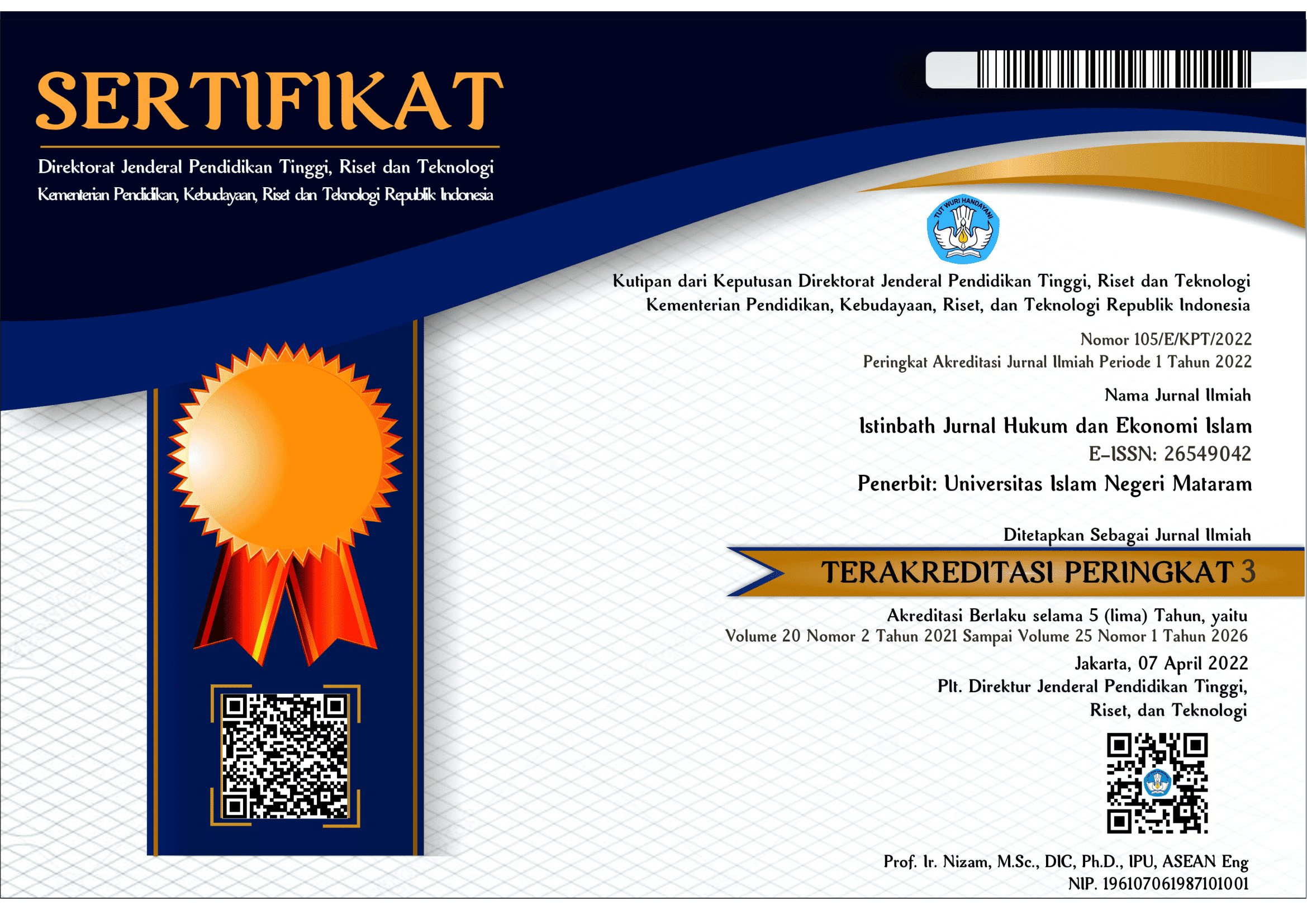HERMENEUTIK-NEGOSIASI DALAM STUDI FATWA-FATWA KEAGAMAAN: ANALISIS KRITIK TERHADAP PEMIKIRAN KHALED M. ABOU EL FADL
DOI:
https://doi.org/10.20414/ijhi.v19i1.204Keywords:
Fatwa, Kompetensi, Penetapan, Otoritas, Hermeneutik-NegosiasiAbstract
This paper discusses the contributions of Khaled M. Abou El Fadl in wrestling the text (al-ta’amul ma’a al-nash), which results in the implications of Islamic law. The contribution stems from his academic anxieties seeing the misogynist fatwas issued by official institutions such as the Council for Scientific Research and Legal Opinion (CRLO) in Saudi Arabia and The Society for Adherence to The Sunnah (SAS) in America. The fatwas that degrading the woman is regarded as the will of God who should not be appealed and debated. Khaled argues that the fatwa is an act of arbitrariness (despotism) and authoritarianism. By using library research and qualitative analysis, there are three results in this article. Firstly, the special group must obey the five prerequisites in order not to happen arbitrariness in interpretation and fall in authoritarianism, namely honesty, diligence, frankness, rationality, and selfrestraint. Secondly, the Qur’an competence in terms of authenticity differs from the hadith. The Qur’an is God’s authenticity. While the hadith, there are several inconsistencies that need to debate and implication on the thought of Islamic law. Thirdly, there are three elements that play a role in determining meaning in an interpretation, namely author, text, and reader. There is nothing most dominant among the three. The three relationships are given proportionally through the negotiation process, dynamic and participatory interactions in creating meaning.
References
Yogyakarta: Pustaka Pelajar, 2006.
About Khaled Abou El Fadl, https://www.searchforbeauty.org/khaled-abou-el-fadl/,
diakses pada 28 Maret 2020.
Al-Ghazali, Imam Abu Hamid Muhammad Ibn Muhammad, Al-Mustasyfa Min Ulum
Al-Ushul, Baghdad: Al-Mustanna, 1970.
Arendt, Hannah, “What is Authority,†dalam Between Past and Future, New York:
Penguin Books, 1993.
Arkoun, Mohammed, “Rethinking Islam Today,†dalam Charles Kurzman (Ed.),
Liberal Islam a Sourch Book, New York: Oxford University Press, 1998.
El Fadl, Khaled M. Abou, Atas Nama Tuhan: Dari Fikih Otoriter ke Fikih Otoritatif,
Penterjemah R. Cecep Lukman Yasin, Jakarta: PT Serambi Ilmu Semesta,
2004.
---------, Reasoning with God: Reclaiming Shari’ah in the Modern Age, Lanham, Md:
Rowman & Littlefield Publishers, 2014.
---------, Speaking in God’s Name: Islamic Law, Authority, and Women, Oxford: Oneworld
Publications, 2001.
Fadhilah, Iman, “Fatwa Kontroversial CRLO dalam Pandangan Khaled Abou El Fadl
(Studi Kritik Otoritarianisme Fiqh),†Jurnal IQTISAD, Vol. 4, No. 2, 2017.
Friedman, R. B., “On the Concept of Authority in Political Philosophy,†dalam Joseph
Raz (Ed.), Authority, (Oxford: Basil Blackwell, 1990), h. 56-91.
Hakim, Muhammad Lutfi, “Rekonstruksi Hak Ijbar Wali (Aplikasi Teori Perubahan
Hukum dan Sosial Ibn al-Qayyim Al-Jawziyyah),†Al-Manahij: Jurnal Kajian
Hukum Islam, Vol. 8, No. 1, 2014. https://doi.org/10.24090/mnh.v8i1.401.
Izzudin, Abdul Hafiz, dkk., “Konsep Hermeneutika Otoritatif Khaled Abou El-Fadl,â€
Maraji: Jurnal Kependidikan, Vol. 1, No. 1, Oktober 2019.
Kamus Besar Bahasa Indonesia (KBBI), Entitas, https://kbbi.web.id/entitas, diakses
pada 31 Maret 2020.
Khaled Abou El Fadl - Full Bibliography, https://www.searchforbeauty.org/fullbibliography/, diakses pada 28 Maret 2020. Lihat: https://www.youtube.com/
channel/UCg7QzYT0TRKJZc9jgXW8bRg.
Knott, Kim, Insider/Outsider Perspectives, dalam John R. Hinnells, The Routledge
Companion to the Study of Religion, London: Routledge Taylor and Fancis Group,
2005.
Mahsus, Muhammad, “Tafsir Kontekstual dan Eksistensi Perempuan serta
Implikasinya terhadap Penyetaraan Bagian Waris Laki-Laki dan Perempuan,â€
JIL: Journal of Islamic Law, Vol. 1, No. 1, 2020.
Matswah, Akrimi, “Hermeneutika Negosiatif Khaled M. Abou El Fadl terhadap
Hadis Nabi,†ADDIN, Vol. 7, No. 2, Agustus 2013.
Muhtador, Moh., “Pergulatan Otoritas dan Otoritarianisme dalam Penafsiran
(Pembacaan Hermenuetis Khaled Abou El Fadl),†QOF, Vol. 2, No. 1, Januari
2018.
Munitz, Milton K., Contemporary Analytic Philosophy, New York: MacMillan Publishing
CO., Inc, 1981.
Muzayyin, “Hermeneutika Hukum Islam Khaleed Abou El Fadl: Sebuah Tawaran
dalam Membendung Otoritarianisme Fatwa MUI, POTRET PEMIKIRAN, Vol.
20, No. 1, Januari-Juni 2016.
Nasrullah, “Hermeneutika Otoritatif Khaled M. Abou El Fadl: Metode Kritik atas
Penafsiran Otoritarianisme dalam Pemikiran Islam,†Jurnal Hunafa, Vol. 5, No.
2, Agustus 2008.
Permanent Committee for Scholarly Research and Ifta, https://en.wikipedia.org/
wiki/Permanent_Committee_for_Scholarly_Research_and_Ifta, diakses pada
21 Maret 2020.
Qudsi, Saifuddin, “Perspektif Khaled Abou el-Fadl dalam Membendung
Otoritarianisme Tafsir Keagamaan melalui Hermeneutika Negosiatif,†Religió:
Jurnal Studi Agama-Agama, Vol. 3, No. 1, Maret 2013.
Rahman, Fazlur, Islam and Modernitas: Tranformation of an Intellectual Tradition,
Chicago and London: Univercity Press, 1982.
Raisul, “Pemikiran Hukum Islam Khaled Abou El Fadl,†Mazahib, Vol. 14, No. 2,
Desember 2015.
Rohmanu, Abid, “Khaled Abou El-Fadl dan Orientasi Humanistik dalam Studi Fiqh,â€
Justicia Islamica: Jurnal Kajian Hukum dan Sosial, Vol. 8, No. 2, 2011.
Saeed, Abdullah, Interpretating the Qur’an Toward a Contemporary Aprroach, London
and New York: Routledge, 2006.
Sofyan, Muhammad, “Konsep Hermeneutika Otoritatif Khaled Abou El-Fadl,â€
Kalam: Jurnal Studi Agama dan Pemikiran Islam, Vol. 9, No. 2, Desember 2015.
Soroush, Abdul Karim, Reason, Freedom, & Democracy in Islam, New York: Oxford
University Press, 2000.
Syahrur, Muhammad, Al-Kitab wa al-Qur’an: Qira’ah Muasirah, Damaskus: Al-Ahali li
al-Tiba’ah wa al-Nasr wa al-Tawzi, 1990.
Syamsuddin, Sahiron, Hermeneutika dan Pengembangan Ulumul Qur’an, Yogyakarta:
Pesantren Nawesea Press, 2009.
Zainuddin, Muslim, “Membaca Tafsir Hermeneutika Otoritas Khaled Abou El Fadl,â€
Dusturiyah: Jurnal Hukum Islam, Perundang-Undangan dan Pranata Sosial, Vol. 9,
No.1, Januari-Juni 2019.





